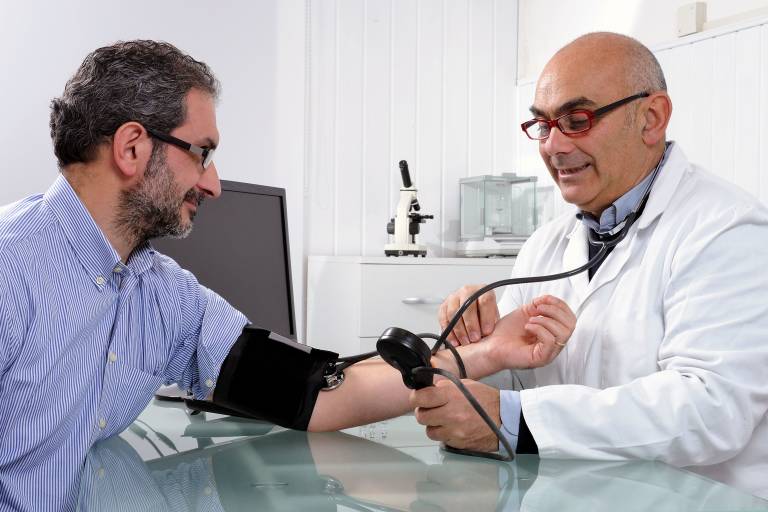Do you know age is one of the causes of high blood pressure?

The risk of experiencing high blood pressure or hypertension increases as you get older. To avoid complications, it is important to regularly measure your blood pressure, adopt a healthy lifestyle and consistently take any medication prescribed by your doctor.
What are the causes of high blood pressure?1
Blood pressure is the force of blood pushing against the walls of arteries as the heart pumps blood. It can be measured with a blood pressure cuff placed around your arm that tightens and then gradually loosens. The results are given in two numbers:
- The first number, called systolic blood pressure, is the pressure caused by your heart contracting and pushing out blood.
- The second number, called diastolic blood pressure, is the pressure when your heart relaxes and fills with blood.
A blood pressure reading is given as the systolic blood pressure number over the diastolic blood pressure number. Blood pressure levels are classified based on those two numbers:
- Low blood pressure, or hypotension, is systolic blood pressure lower than 90 or diastolic blood pressure lower than 60.
- Normal blood pressure for most adults is defined as a systolic pressure of less than 120 and a diastolic pressure of less than 80.
- Elevated blood pressure is defined as a systolic pressure between 120 and 139 with a diastolic pressure of less than 89.
- High blood pressure, also called hypertension, is defined as systolic pressure of 140 or higher, or a diastolic pressure of 90 or higher.
Anyone can have high blood pressure. The causes of high blood pressure include:
- Medical conditions, such as metabolic syndrome, kidney disease, and thyroid problems
- Gender: before age 55, men have a greater chance of having high blood pressure. Women are more likely to have high blood pressure after menopause
- Family history
- Race: African Americans are at increased risk for high blood pressure
- Age: the chance of having high blood pressure increases as you get older
Why is age one of the main causes of high blood pressure?1,2
High blood pressure is a major health problem that is common in older adults. Your body’s network of blood vessels, known as the vascular system, changes with age. Arteries get stiffer, causing blood pressure to go up. This can be true even for people who have heart-healthy habits and feel fine.
For older adults, often the systolic blood pressure is 130 or higher, but the diastolic blood pressure is less than 80. This problem is called isolated systolic hypertension and is due to age-related stiffening of the major arteries. It is the most usual form of high blood pressure in older adults and can lead to serious health problems in addition to shortness of breath during light physical activity, lightheadedness upon standing too fast, and falls.
Indeed, if high blood pressure is not controlled with lifestyle changes and medication, it can lead to serious health problems, including:
- Cardiovascular diseases such as heart failure, atrial fibrillation, and stroke
- Vascular dementia
- Eye problems
- Kidney diseases
Moreover, hypertension in the elderly is associated with an accelerated decline in health status and frailty, which is defined as a condition of increased vulnerability to stressors leading to a reduced ability to combat potential acute negative events and reduced ability to maintain homeostasis. Frailty can lead to an increased risk of adverse health outcomes.
According to the European Society of Cardiology, measuring your blood pressure is important at all ages, but especially as you age. If you are diagnosed with hypertension, you need to treat this condition because by treating it you could reduce both your cardiovascular and overall risk.

What are the indications of high blood pressure?3
Most people with hypertension do not feel any symptoms. Checking your blood pressure is the best way to know if you have high blood pressure. Very high blood pressures—180/120 or higher—can cause:
- Headaches
- Blurred vision or other vision changes
- Chest pain
- Dizziness
- Difficulty breathing
- Nausea
- Vomiting
- Anxiety
- Confusion
- Buzzing in the ears
- Nosebleeds
- Abnormal heart rhythm
If you are experiencing any of these symptoms and a high blood pressure, seek care immediately.

What are the differences between blood pressure and heart rate?4
Blood pressure and heart rate are both related to your cardiovascular system. Each play distinct roles and measure distinctly different factors related to your heart health:
- Heart rate, also called pulse, is the number of times your heart beats every minute. Changes in your heart rate can be influenced by factors, such as physical activity, emotions, and medications.
- As previously explained, blood pressure is the force of blood flowing against the walls of your arteries. Its values indicate the health of your cardiovascular system.
Your heart rate and blood pressure can impact each other in diverse ways. Blood pressure and heart rate often rise and fall together. For example, when you face danger, your blood pressure and heart rate may both increase at the same time. But if your heart rate rises, that does not automatically mean your blood pressure will rise, or vice versa.
What is the normal heart rate by age?5
The normal resting heart rate for people aged 15 and up is 60 to 100 beats per minute or bpm. It varies, according to your age.
It is also important to know:
- The normal maximum heart rate during vigorous activity: To find it, subtract your age from 220.
- The target heart rate for your age: It should be about 50% to 70% of your maximum heart rate during moderate-intensity activity, such as walking. During more intense activity, such as exercising, running, or working out with weights, your target heart rate should be about 70% to 85% of your maximum heart rate.
Here are the target heart rate zones (50% to 85%) and the average maximum heart rates (100%) by age for adults:
- 20 years: 100 to 170 bpm // 200 bpm
- 30 years: 95 to 162 bpm // 190 bpm
- 35 years: 93 to 157 bpm // 185 bpm
- 40 years: 90 to 153 bpm // 180 bpm
- 45 years: 88 to 149 bpm // 175 bpm
- 50 years: 85 to 145 bpm // 170 bpm.
- 55 years: 83 to 140 bpm // 165 bpm
- 60 years: 80 to 136 bpm // 160 bpm
- 65 years: 78 to 132 bpm // 155 bpm
- 70 years: 75 to 128 bpm // 150 bpm